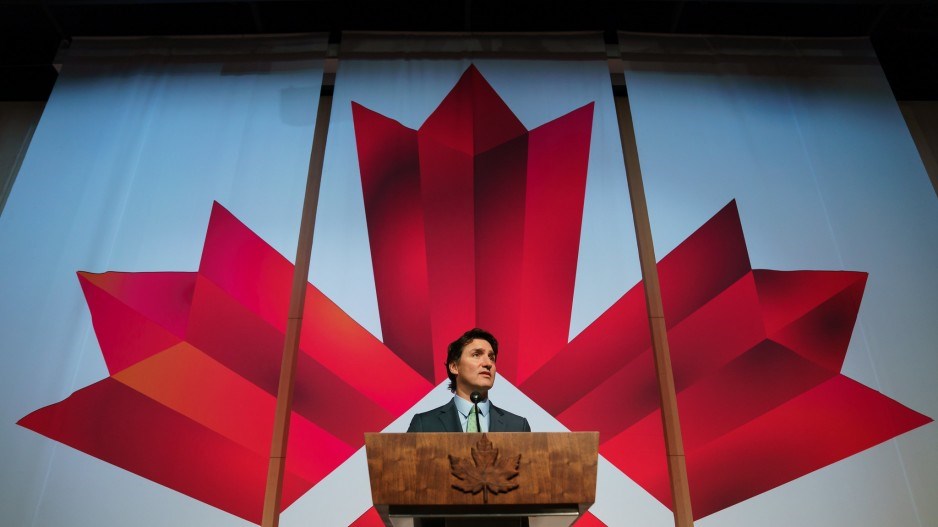For Liberal Party supporters, the past few days were supposed to mark the start of a comeback.
After several disappointing weeks for Justin Trudeau and the federal government, the opportunity to reconnect with Canadians appeared within grasp.
A couple of perceived gaffes from Conservative Party leader Pierre Poilievre – on Ukraine and border security – were supposed to let voters ponder what they have and what they could be getting after the next election.
Research Co. and Glacier Media asked Canadians about federal politics over the weekend. It was a time of pointed criticism towards the Official Opposition leader in both traditional media and social media, with the now all-too-familiar war of “Community Notes” trying to make sense of time zones and broadcasts.
Not all voters, as we know too well, are active on social media platforms. In our survey, the Conservatives remain well ahead nationally with the support of 38 per cent of decided voters across Canada. The Liberals have lost seven points since September, and now sit at 24 per cent nationally.
The New Democratic Party (NDP) is now a close third with 21 per cent (up four points), followed by the Bloc Québécois with nine per cent (up one point), the Green Party with four per cent (up one point) and the People’s Party with two per cent (up one point).
The days of Liberal popularity among women appear to have come to an end, with the Conservatives leading by 10 points (35 per cent to 25 per cent). Among men, the Official Opposition has an even larger advantage (41 per cent to 23 per cent).
Since September, the Conservatives have solidified their frontrunner status in Ontario (42 per cent, up two points) and British Columbia (45 per cent, up three points). In Atlantic Canada, 47 per cent of decided voters are ready to cast a ballot for the Tories. The Liberals are now only ahead in Quebec (34 per cent, with the Bloc at 29 per cent).
The approval rating for Trudeau fell two points to 39 per cent, while Poilievre gained six points to reach 47 per cent. NDP leader Jagmeet Singh is still at 48 per cent, with the remaining party leaders posting significantly lower numbers: Elizabeth May of the Greens at 34 per cent (up two points), Yves-François Blanchet of the Bloc at 21 per cent (up one point) and Maxime Bernier of the People’s Party at 19 per cent (down one point).
In September, we reported on a tie between Trudeau and Poilievre as the “Preferred Prime Minister” for Canadians. With four weeks left in 2023, the Conservative leader now has a nine-point edge over the current head of government (32 per cent to 23 per cent). There is a remarkable data nugget on this question: Only 53 per cent of Liberal voters in 2021 selected Trudeau. This means that almost half of those who supported the governing party two years ago are looking elsewhere for leadership (15 per cent to Poilievre and 11 per cent to Singh) or are not sure about where to go (16 per cent).
The proportion of Canadians who are satisfied with what the Liberals and the NDP have accomplished since their March 2022 supply and confidence agreement fell a couple of points to 42 per cent. The fall economic statement did little to help the Liberals on the financial front. Only 37 per cent of Canadians (down seven points) are comfortable with Trudeau being in charge of the national economy. On the same question, Poilievre gained five points to reach 47 per cent.
British Columbians are no strangers to seeing housing, homelessness and poverty as the most important provincial issue. It is clear that it has gained prominence at the national level as well, with almost three in 10 Canadians (29 per cent, up four points) placing it as their foremost concern, ahead of the economy and jobs (21 per cent, up one point), health care (19 per cent, down five points), the environment (six per cent, down four points) and immigration (also six per cent, up three points).
The Liberal comeback has not started. Right now, Canadians are doubtful about the accomplishments of the current federal government buttressed by the New Democrats. In British Columbia, only 18 per cent of decided voters would back the Liberal candidate in their constituency. This is just five points higher than the 13 per cent the party received under Michael Ignatieff in 2011 in an election where the Liberals held on to just two seats in the province: Vancouver Centre and Vancouver Quadra.
If an election were held tomorrow, Canadians aged 35 to 54 would be primarily responsible for a Conservative victory. This block of voters has lived for eight years under a Trudeau government and has become increasingly bitter. Only 19 per cent of them say the current prime minister is their preferred choice for the top job, down five points since September. In contrast, the proportion of Canadians aged 35 to 54 who express a desire for Poilievre to take over grew from 32 per cent to 36 per cent.
Mario Canseco is president of Research Co.
Results are based on an online survey conducted from Nov. 25-27, 2023, among 1,000 adults in Canada. The data has been statistically weighted according to Canadian census figures for age, gender and region. The margin of error – which measures sample variability – is plus or minus 3.1 percentage points, 19 times out of 20.



